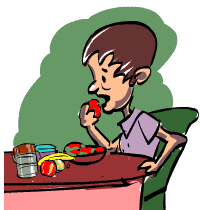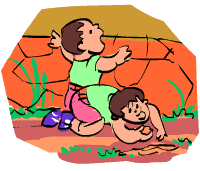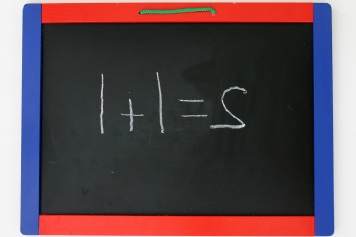
Eating Disorders [Illustration by Shiju George]
- Anorexia
- Regurgitation
- Pica
Anorexia
Of all behaviour problems anorexia is most common in children. But it can be easily prevented and cured. A mother’s most common complaint is that the child does not eat anything. The mother says she has tried everything to make him eat. Therein lies the trouble, for if she had tried nothing there would have been no difficulty at all.
Causes of Anorexia
Development of ego: Some children will not eat if they are not allowed to hold spoon and feed themselves. Food refusal is due to a child’s increasing determination and his developing ego. They discover that their mother is most anxious for him to eat that particular foodstuff. If a child retains the food, after a while he spits it out or vomits it. The basic cause is once again force feeding. All attempts of forcing the child to eat should be stopped. When a child refuses food in weaning period it is good plan to offer him breast milk first and then to offer new food when he is in better temper. There must be no persuasion. The new food offered should be given in small bits and eaten in more quantity.
Likes and dislikes: Even a five month-old child may have likes or dislikes. A child likes variety and becomes tired of eating the same food over and over again. Whatever happens there should be no attempt to force him to eat what he does not like. This would cause not only food refusal but also often a permanent dislike of food. As for older children, the food should be given and mother should not show any signs of anxiety. The child senses anxiety from facial expression. Child will eat whatever he wants. There should be no bribing, no punishment and then nothing should be given in between meals.
Same diet: A child’s diet should keep changing so as to keep boredom at bay. The same menu may get irritating for the child and he may not wish to eat at all. Also any painful experience, like when the food was hot may be remembered by the child as young as six months of age. The food should be made to look attractive and palatable which are very important factors to increase the food intake of the child. The child should be encouraged to practice new skills.Most common question is what should a mother do if a child does not touch anything? The answer is not to give anything before the next meal. No child will starve if he is kept hungry. The only way to deal with this problem is to make no fuss, but simply to allow a reasonable time for him to eat and to leave when he does not wish to eat. As soon as the child realises he cannot cause more fuss and attract more attention, food refusal stops. Once feeding problem develops, it takes time understanding and patience to tackle this problem.
Regurgitation
 This is a habit acquired usually after the age of three months. The symptom involves repeated regurgitation of food. A child may spit out food or chew or swallow it again. It usually occurs when the child is alert and rarely when the child is sleeping or is doing some other activity. There are two types of ruminators- psychogenic and self-stimulating. Psychogenic occurs in children with otherwise normal development but there could be disturbed child parent relationship. Self-stimulating type occurs in mentally challenged individuals of any age and may be present even in the presence of nurturing parents. Behavioural treatment is directed towards correct eating behaviour.
This is a habit acquired usually after the age of three months. The symptom involves repeated regurgitation of food. A child may spit out food or chew or swallow it again. It usually occurs when the child is alert and rarely when the child is sleeping or is doing some other activity. There are two types of ruminators- psychogenic and self-stimulating. Psychogenic occurs in children with otherwise normal development but there could be disturbed child parent relationship. Self-stimulating type occurs in mentally challenged individuals of any age and may be present even in the presence of nurturing parents. Behavioural treatment is directed towards correct eating behaviour.
Pica
Pica refers to regular eating of non-nutritive substances. This could include chewing on pencil erasers, paint, paper, sand and paint etc. There is a chance that it could be hereditary. Usually parents also have had the same problem. It could also be due to anemia or worm infestation. Deficiency of zinc or iron can be a common cause. It is important to consult the doctor, to rule out both, anemia or worm infestation. Otherwise the child should be encouraged to give up the habit of chewing unhealthy objects by distracting him.










